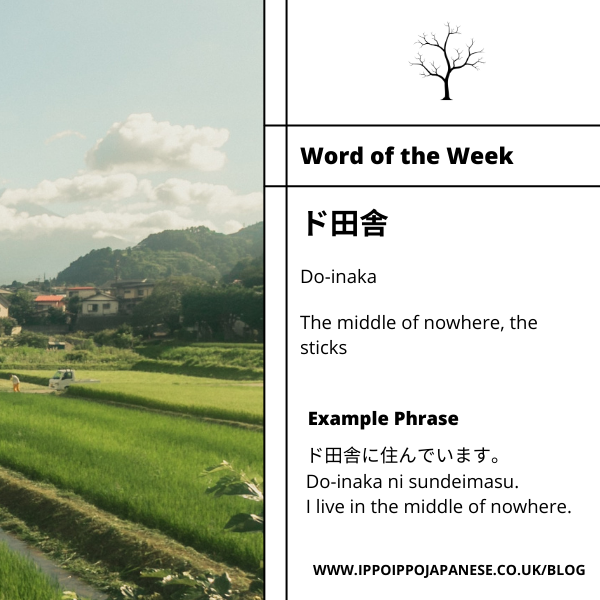Posted: 19th Sept 2023
Hello and welcome to the Ippo Ippo Japanese Word of the Week!
This Week's Word Is...
ド田舎
- In hiragana: どいなか
- In rōmaji: do-inaka*
Or "do inaka" - I prefer to add the hyphen to show the connection between the two parts of the word, but this is entirely optional.
Before We Begin
None of the links in this post are affiliated, which means I don't make money via companies like Amazon when you click on them. If you'd like to support the blog with a donation (however small!), you can do so via Ko-fi.
How Do You Pronounce ド田舎 (do-inaka)?
Quick tip: the "do" in "do-inaka" is not pronounced the same as the English word "do". Instead, it's a bit more like a Homer Simpson-esque "doh" or the "do" part of "do re mi" (think Sound of Music).
Visit Forvo to hear an example pronunciation.
What Doesド田舎 (do-inaka) Mean?
ド田舎 (do-inaka) has a few potential English translations, including:
- The middle of nowhere
- The sticks (as in "out in the sticks")
- The remote countryside
- The boondocks/boonies*
*Not a word I'm familiar with, but if you're from the US or Canada you may know this expression.
To break it down:
- 田舎 (inaka) by itself means "countryside".
- ド (do) can be added to the front of some words for emphasis. In this case, it has the effect of marking just how rural (how in the middle of nowhere) a place is. (Source: Weblio.)
How is it Written?
If you already know a little about Japanese scripts, you may have noticed something interesting about this word: it contains the somewhat unusual combination of katakana + kanji.
- ド (do) - katakana
- 田舎 (inaka) - kanji
While it is possible to write the first part of this word using hiragana ど (do), the katakana version of the spelling (ド田舎) appears to be far more popular, yielding 7.3m results on Google in comparison with 1.6m for ど田舎 at the time of writing.
As described above, the "do" part of the word is all about adding emphasis. As katakana is often perceived as a stronger, more emphatic script (a bit like writing in bold or ALL CAPS), ど田舎 may come across as a softer way of writing the word.
How to Use ド田舎 (do-inaka) in a Sentence
Let's talk about how the word is used.
Example Sentences
- 彼はド田舎に住んでいます。(Kare wa do-inaka ni sundeimasu - He lives in the middle of nowhere)
- ど田舎で育った。(Do-inaka de sodatta - I grew up/was raised in the countryside)
- 「ド田舎」には、スタバも電車もバスも信号もない!("Do-inaka" ni wa, sutaba mo densha mo basu mo shingō mo nai! - In the "do-inaka" there's no Starbucks, no trains, no buses, no traffic lights!)
If you're relatively advanced in your Japanese reading skills (approx. N3-N2 level or above), check out this illustrated blog post titled 田舎といえば田舎だけどド田舎ってほどでもない田舎あるあるでござる。
Sources:
- Benesse (the specific page I used has been taken down since I wrote this post)
- NIC Method English
Bonus Note: What Counts as 田舎 (inaka)?
As someone who grew up in relative ド田舎 (do-inaka) in Scotland, I was often struck by the way 田舎 (inaka - the countryside) in general was talked about in Japan.
At some point during my first stay in Japan as a student, I remember travelling by train from one pretty sizeable city to another. Just as I was noticing how the urban sprawl seemed never to end, my Japanese friend who I sitting with pointed out the window, saying something along the lines of すごい田舎でしょ?(Sugoi inaka desho? - Really rural, right?) - much to my confusion.
Moments like this happened multiple times during my time in Japan. I'll never forget the excitement of being invited to a friend's house in 田舎 (inaka) only to be disappointed to find that they lived well within what felt to me like suburbia.
As my Japanese improved, I asked friends about what they considered 田舎 (inaka), from which I gathered that generally anywhere with the odd field - even sandwiched between houses, like an allotment - could count as 田舎 (inaka). This somewhat boggled my mind, as to me "the countryside" means somewhere with barely any buildings to be seen, with wide-open landscape, fields or forest stretching for miles.
While I'm no expert on this topic and suspect my sample is somewhat biased by mostly talking to those who grew up in urban areas, I do think it's interesting to notice how concepts we take for granted - and expect to have like-for-like translations with our own language - can be so different depending where we are in the world.
Have you ever come across a word like this that took you by surprise like this? Do you feel like it taught you something about the culture of the place you were in? Or did it leave you with more questions to explore?
You've reached the end of this post! I hope you enjoyed it.
For updates on posts like this sent straight to your inbox, sign up to my newsletter (sent no more than once a month):

Support Me on Ko-fi
If you've enjoyed this post and would like to see more like it in future, please consider sending a donation - however small! - via Ko-fi. I don't include any affiliated links or ads on my blog, so every little helps!
Please donate via the portal below or by going directly to the Ippo Ippo Japanese Ko-fi page.







